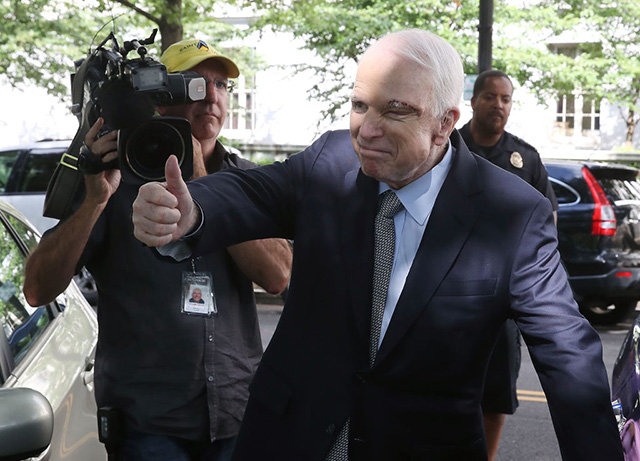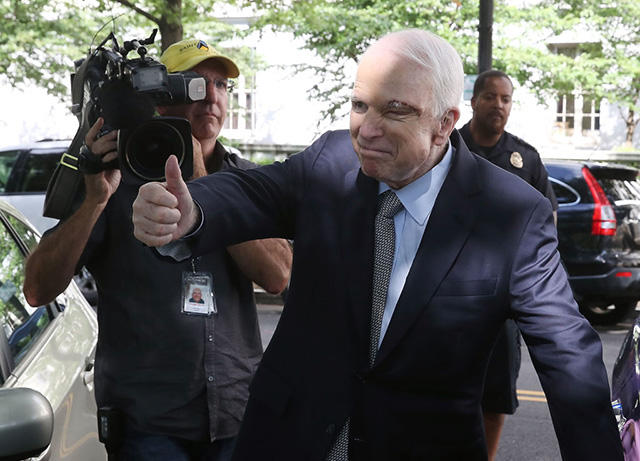
 Sen. John McCain gives a thumbs up to well wishers as he gets into his car at the US Capitol July 25, 2017, in Washington, DC. McCain was recently diagnosed with brain cancer but returned on the day the Senate held a key procedural vote on President Donald Trump’s effort to repeal and replace the Affordable Care Act. (Photo: Mark Wilson / Getty Images)
Sen. John McCain gives a thumbs up to well wishers as he gets into his car at the US Capitol July 25, 2017, in Washington, DC. McCain was recently diagnosed with brain cancer but returned on the day the Senate held a key procedural vote on President Donald Trump’s effort to repeal and replace the Affordable Care Act. (Photo: Mark Wilson / Getty Images)
Yesterday’s drama began with the “vote to proceed” on the Senate’s ACA repeal legislation, the utility vote needed to open a bill up for floor debate and offered amendments … except it wasn’t that, it couldn’t be that, because there was no specific piece of legislation being offered when the procedural vote began. No one in that chamber, not even Senate Majority Leader Mitch McConnell, knew which bill they were voting to debate. It was positively surreal.
This drama was multi-layered as the procedural vote loomed. If the Republicans failed to garner 51 votes to open debate, the whole Obamacare repeal fiasco would have collapsed then and there in an ignominious cough of dust (for now). Sen. Susan Collins of Maine and Sen. Lisa Murkowski of Alaska were hard “No” votes, along with every Democrat in the chamber. Sen. Rand Paul of Kentucky voted to approve debate, as did Sen. Dean Heller, Sen. Shelley Moore Capito and a number of previous “No’s.” The C-SPAN shot of the room was dominated by the image of McConnell leaning into Ron Johnson like a baseball manager jawjacking an umpire. There were 48 “Yes” votes, 50 “No” votes, and the whole thing was hanging in the balance …
… and then hail the conquering hero, Sen. John McCain walked briskly into the room to peals of thunderous applause from his colleagues. McCain, absent since being diagnosed with an aggressive brain tumor, made a special and likely dangerous journey from Arizona to cast his vote. The voice of the clerk rang out over the tumult: “John McCain, aye.” Within seconds, the clerk was heard again: “Ron Johnson, aye.” Vice President Pence dropped the 51st vote, and the bill that didn’t exist was open to debate and amendment.
Late Tuesday night, McConnell brought an amended version of the full Better Care Reconciliation Act (BCRA) — otherwise known as “Repeal and Replace” — to the floor for a vote, and was promptly smoked. The final tally was 57-43 against. Nine Republican senators — Collins, Corker, Cotton, Graham, Heller, Lee, Moran, Murkowski and Paul — joined every Democrat in opposition. Among the “Yes” votes? John McCain.
This was interesting, because McCain had seized the moment that afternoon by delivering a fiery finger-jabbing speech in which he denounced the legislation he had just helped keep alive while excoriating his colleagues for their own incompetence throughout the whole sorry repeal affair. He swore a mighty oath that he would not support the BCRA as it was written. As I watched him give perhaps the last speech of his long career and registered his “Yes” vote later that night, I could not help but be struck by the irony of the moment.
I am not one who worships at the altar of John McCain. I am the son of a Vietnam veteran, and I recognize that McCain experienced great pain and hardship during his military career. Yet as a senator, he has voted for virtually every terrible idea that has come down the pike during his long tenure, the Iraq War and the PATRIOT Act prominent among them.
In 2000, George W. Bush and Karl Rove brutalized McCain with a series of gruesome attacks during the South Carolina primary, claiming that during his time in a Vietnamese prison camp he had colluded with his captors for better treatment. They even let fly a racist whisper campaign that McCain was secretly the father of a Black child. McCain rewarded this behavior four years later by publicly embracing Bush, the second-worst president of my lifetime, to help his presidential reelection campaign. Unfortunately, it helped.
Three years after that sorry display, McCain took a walk in a Baghdad market to prove to the media naysayers that Iraq was “safe.” While the press cameras clicked away, he was guarded by 100 US soldiers and helicopter air cover during his stroll, many of whom could have died that day in the service of campaign grandstanding. A few days after McCain left the country, there was a slaughter in that market as militants sought to show Mr. McCain the true definition of “unsafe” by killing everyone they saw. The consequences of the US invasion and occupation were all too clear, and the people in that market died for McCain’s photo opportunity.
Moreover, John McCain, lushly praised for his wisdom and sagacity, thought Sarah Palin was a good idea. That, right there, says it all.
So when McCain stood there in the Senate and held forth on the sanctity of senators’ responsibilities as elected officials, all I could see was a guy with the kind of spectacular health insurance that availed him the treatment and resources needed to undergo serious brain surgery, fly 2,000 miles to give a speech and then vote in favor of depriving millions of people of their access to health care. The legislation he so vehemently denounced by day could have been properly ended by his hand during the procedural vote. He voted, instead, to keep it alive, and later that evening he voted to deprive millions of people access to health insurance while ending Medicaid as we know it. He lost, thankfully. I see no hero here.
Matters remain in flux at this juncture, and the strangeness of it all permeates the process: Fifty senators voted to open debate on nothing. Once they got something, it was soundly defeated. In the middle of it, the man they call “maverick ” made a grand show of independence and piety before going along with McConnell and the repeal crowd every step of the way. Mighty oaths on health care, even from those with a terrible illness, mean little in the halls of power. Empathy is merely a rumor.
The health of millions remains in peril. While the defeat of the unspeakably cruel “Repeal and Replace” bill should be justly celebrated, rust never sleeps. “Repeal Only” and the “skinny ” bill still lurk. What will transpire? We shall probably have the answer to that question before the end of the week, and the fight will press on.
No retreat, no surrender. If you were waiting for a hero, he ain’t here.
Enjoying what you’re reading? Click here to help Truthout publish more stories like this one.
Join us in defending the truth before it’s too late
The future of independent journalism is uncertain, and the consequences of losing it are too grave to ignore. We have hours left to raise the $12,0000 still needed to ensure Truthout remains safe, strong, and free. Every dollar raised goes directly toward the costs of producing news you can trust.
Please give what you can — because by supporting us with a tax-deductible donation, you’re not just preserving a source of news, you’re helping to safeguard what’s left of our democracy.